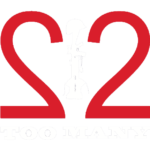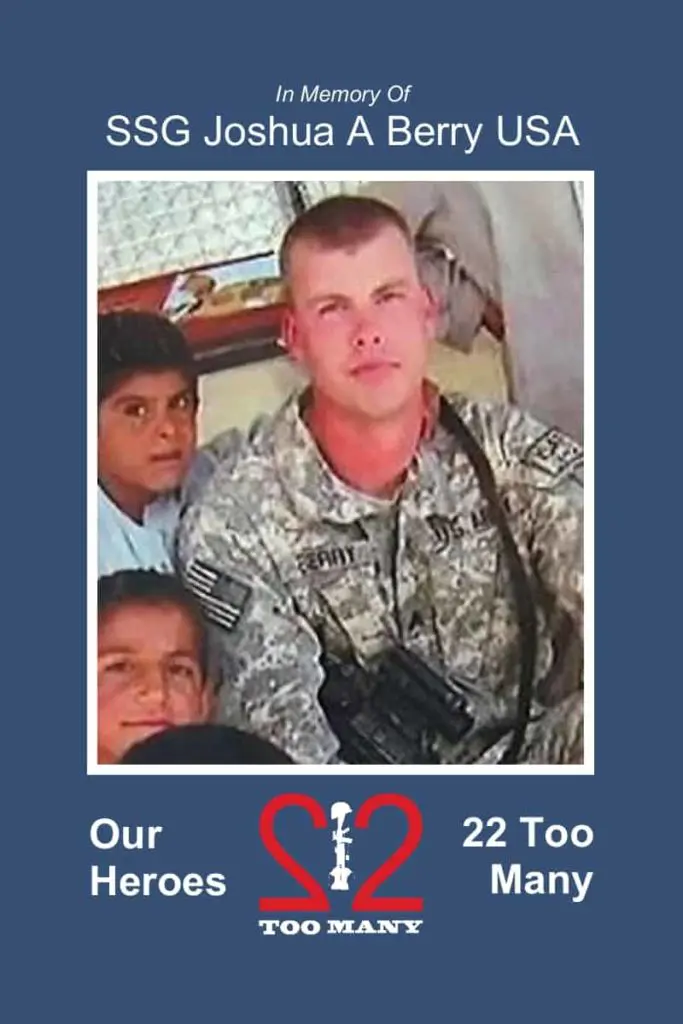Shared by his father, Howard, after speaking to Josh on the phone: “He felt like he had won the lottery.” Joshua Berry was excited and eager – ready to be finally heading home from Afghanistan via Fort Hood. After a year-long deployment in Afghanistan, SGT Berry was in a transition program at Fort Hood, awaiting redeployment to Fort Knox. When U.S. Army Major Nidal Hasan opened fire on Nov. 5, 2009, SGT Berry helped personnel get to safety in a briefing room. When gunshots hit the room’s door, SGT Berry leaped over a desk to take cover, then dislocating his shoulder.
The injury was surgically repaired and deemed to be caused by the shooting in the line of duty. He was eventually deemed unfit for military service due to post-traumatic stress disorder, his shoulder injury suffered during the Fort Hood attack, and degenerative spinal arthritis.
SGT Berry continued to struggle with PTSD, and died by suicide in February 2013 at age 36. He left behind a daughter (born in 2010).
“Joshua Berry was just days back from a tour in the infantry in Afghanistan in 2009 when shots were fired at him by convicted gunman Maj. Nidal Malik Hasan. Hasan killed 13 soldiers and wounded 32 at Fort Hood, Texas. Joshua Berry was shot at three times and separated his shoulder while locking down a building and telling people to take cover, said his father.”
Joshua’s actions that tragic day saved lives and made him eligible for the Purple Heart (after a long battle to have the Ft. Hood victims’ deaths classified as an act of terrorism instead of ‘workplace violence’). Even though Josh was eligible for the Purple Heart, by some unexplained and arbitrary reason, the decision was rescinded and he never received the recognition he deserved. Howard wanted Josh’s little girl to have the Purple Heart, so that as she grew up without him, she would know her daddy was a hero.
——————————-
Shared by Howard Berry, Josh’s father:
Honoring the Forgotten Soldier
Do you remember the shooting that took place on November 5, 2009? My son, SSG Joshua Berry, was there at Fort Hood when the shooting took place. Suffering terribly from PTSD as a result of the shooting and his time in Afghanistan, Josh committed suicide 39 months later, on February 13, 2013, becoming one of the 22 veterans who take their lives every day. Through the loss of my son, my family has become one of the 660 families who lose a loved one each month because of empty promises and a broken system.
Unfortunately, Josh has become one of the faceless many that are part of a staggering statistic, a number we’re familiar with but can’t understand. 22 a day, 660 a month, 7,920 a year—what do these numbers really look like? What can we do to help support our vets? We can start by educating people so more become involved in the fight to provide better health services.
After spending the last four years writing to all members of Congress, going to Washington DC twice to meet with lawmakers, working with our local VA, and attending each VA town hall meeting they’ve held, it’s clear that the only way to make a change is to get more people involved. That’s why this work is so important.
My mission is to gather enough flags so that these forgotten soldiers can be honored and remembered in each of the fifty states. I believe that if the American people were aware that almost 8,000 veterans die by their own hand every year, we would do whatever it takes to ensure that the brave men and women who have who volunteered to defend our freedom receive the support they were promised when they entered the military. Too many have died from indifference and intolerance. Let’s work to change that.
For more information, check out Howard’s Facebook page: Flags For Forgotten Soldiers
———————————-
“Each one of those flags represents a man or a woman that died by their own hand,” said Berry, who says this isn’t just about his son.
“It breaks my heart, it really does,” said Howard. “To realize that over 7,000 are completing suicide every year and we’ve got to do a better job.”
“I’m tired of burying vets,” Howard Berry said. “I’m tired of people who are being left behind. I’m tired of sitting down and meeting a 25-year-old widow. It’s not just my son who was left behind.” Howard Berry has become an outspoken critic of the VA. He visits with families of veterans who committed suicide.
“These vets are so damaged and we just spit them out into the private sector,” Berry said. “And they fall through the cracks because there are so many.” More treatment for PTSD and traumatic brain injuries is needed, he said.
He’s testified to Congress. Problem is, nobody seems to do more than listen and say they are sorry for your loss, he said.
——————————
From a psychiatric medical board evaluation of Josh in 2011:
The event that led to a dramatic improvement in SGT Berry’s psychiatric status was the birth of his daughter during the summer of 2010. He was very happy to take on his new role as a father and proudly showed other veterans in the PHP program the pictures he had of his newborn daughter. Unfortunately, several weeks after she was born, the service member’s wife sent him a text message stating that she was leaving him due to her discomfort with his ongoing symptoms of PTSD.
SGT Berry then suffered a marked deterioration in his psychiatric status that ultimately led to his being hospitalized in OCT 2010 after his neighbors pulled guns on him when they found the SM walking around the neighborhood in full combat gear. He was discharged a week later on Tegretol, Haldol, Cogentin, Xanax, and prn Vistaril.
“They never see the same person (at the VA),” Berry said. “They never get the medication they need and they can’t get off the medication that they don’t need.”
An incident report from the Warren County Sheriff’s Office after Josh’s death in 2013:
Joshua is prescribed several medications through the VA hospital and has abused them in the past. I located a bottle of Alprazolam 1 mg, filled on 02/08/13 which contained 60 tablets empty on the floor in the living room, two bottles of Oxycodone HCL 5 mg, filled 12/18/12 and 01/11/13 which contained 90 tablets each empty in the bathroom sink, five bottles of Carbamazepine 200 mg containing 60 tablets each full on the kitchen counter. I also found a bottle of Haloperidol 5 mg, containing 30 tablets full on the kitchen counter, a bottle of Lithium Carbonate 450 mg containing 60 tablets full on the kitchen counter, and a bottle of Benztropine Mesylate 1 mg, containing 30 tablets full on the kitchen counter.
—————————–
Commanders in the Army said Josh always placed his unit and mission above himself. He was a gunner, a team leader and once hurt his back running for cover from a rocket attack. Military records indicate Josh “witnessed a number of horrible events in Afghanistan.”
In 2008, his supervisors in the military said Josh had unlimited potential. In 2011, Josh retired as a staff sergeant after officials found him unable to serve because of PTSD, his shoulder injury, depression and arthritis in his spine.
—————————–
The Fort Hood shooter was convicted of premeditated murder in 2013 and sentenced to death. He is in a Kansas prison awaiting execution, and the appeal process could take years to resolve.
Four service members who were at Fort Hood that day and three of their family members have since killed themselves, according to Howard and Dr. Kathy Platoni, a retired Army colonel and psychologist who saw friends die during the shooting. “There will be more,” Platoni says.
The suicide rate for active-duty U.S. military members in 2018 was the highest it’s ever been, according to a recent Department of Defense study. Officials started tracking suicides in 2001. A true number of veteran suicides is virtually impossible to calculate because the VA only reports suicides of veterans in its care.
Howard’s lawsuit is ongoing. The Army, so far, has refused to give his son a Purple Heart. A federal judge is considering the case – and has been for months.
Howard recently spoke to a military father in Illinois. The man’s son killed himself too, and he is now planning a flag display in his own city.
————————-
Howard began another project in July 2017:
“Last July I presented my idea to dedicate the 22 mile marker on Interstate 71 the VETERAN SUICIDE MEMORIAL MILE.” This became a process that took almost three years to bring to completion, but as of March 2020, Ohio has become the first state in the US to designate a “Veteran Suicide Memorial Mile.” Howard would like to see each state have a remembrance mile in honor of our veterans lost to suicide.
———————–
I asked Howard what were some of Josh’s hobbies: “He loved sports, both professional and college. He tried golf as well. Josh met Pete Rose (of the Cincinnati Reds) in Vegas when he was headed back to Afghanistan after being home on leave. I wish Josh had known he was related to Pete, albeit distantly.”
This information has been compiled from a number of articles. To read more, please do a search for Joshua Berry, Fort Hood, and / or Howard Berry.
Howard is fighting his own battle against cancer. Even through his pain, he’s trying to do all he can to remember our fallen lost to PTS and secure better treatment and services for our veterans.
Thank you, Howard, for all you have done and are doing in memory of your son and all those who have lost their inner battle. ~Keri, for all the team at 22 Too Many
#22toomany #OurHeroes are #NeverForgotten

